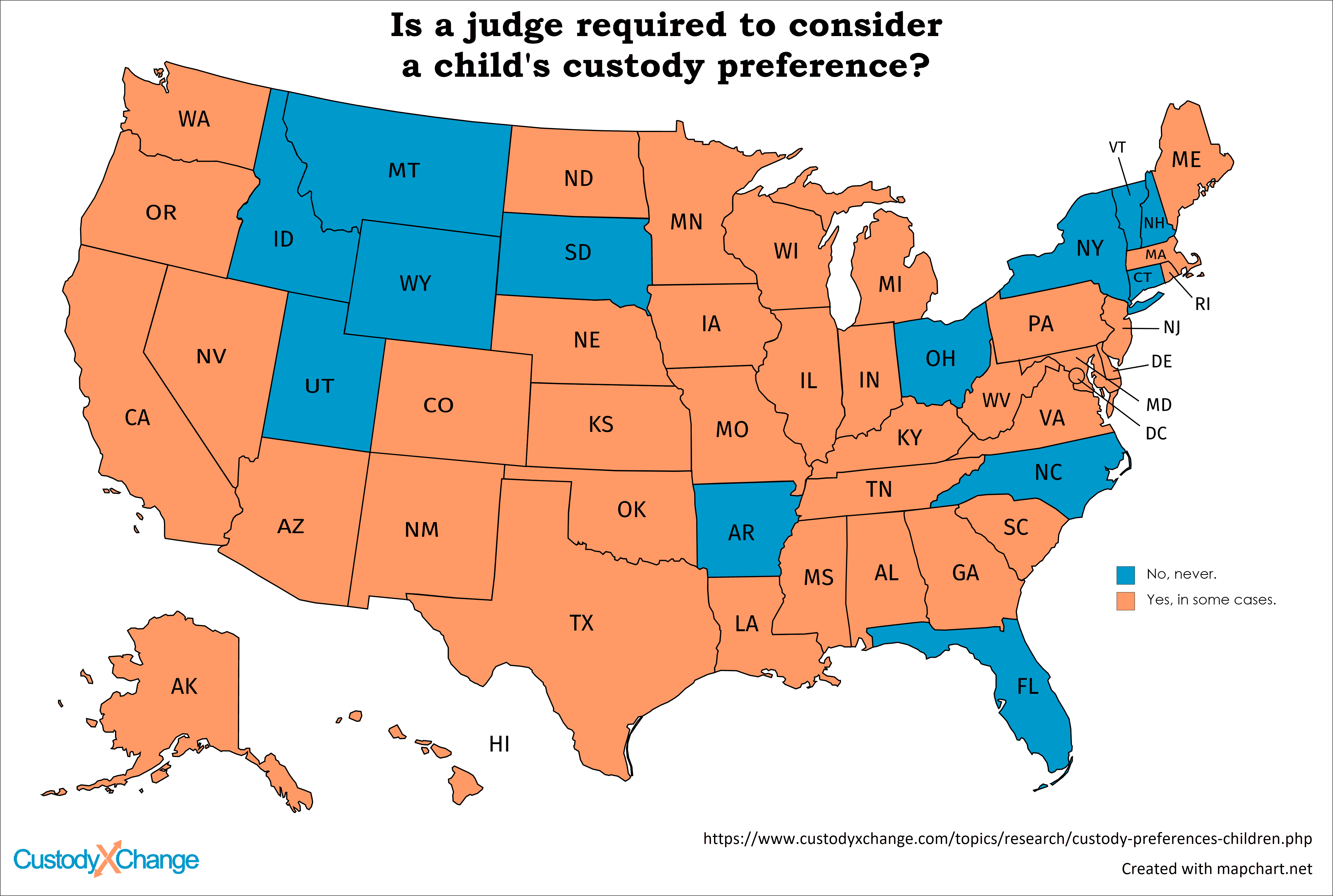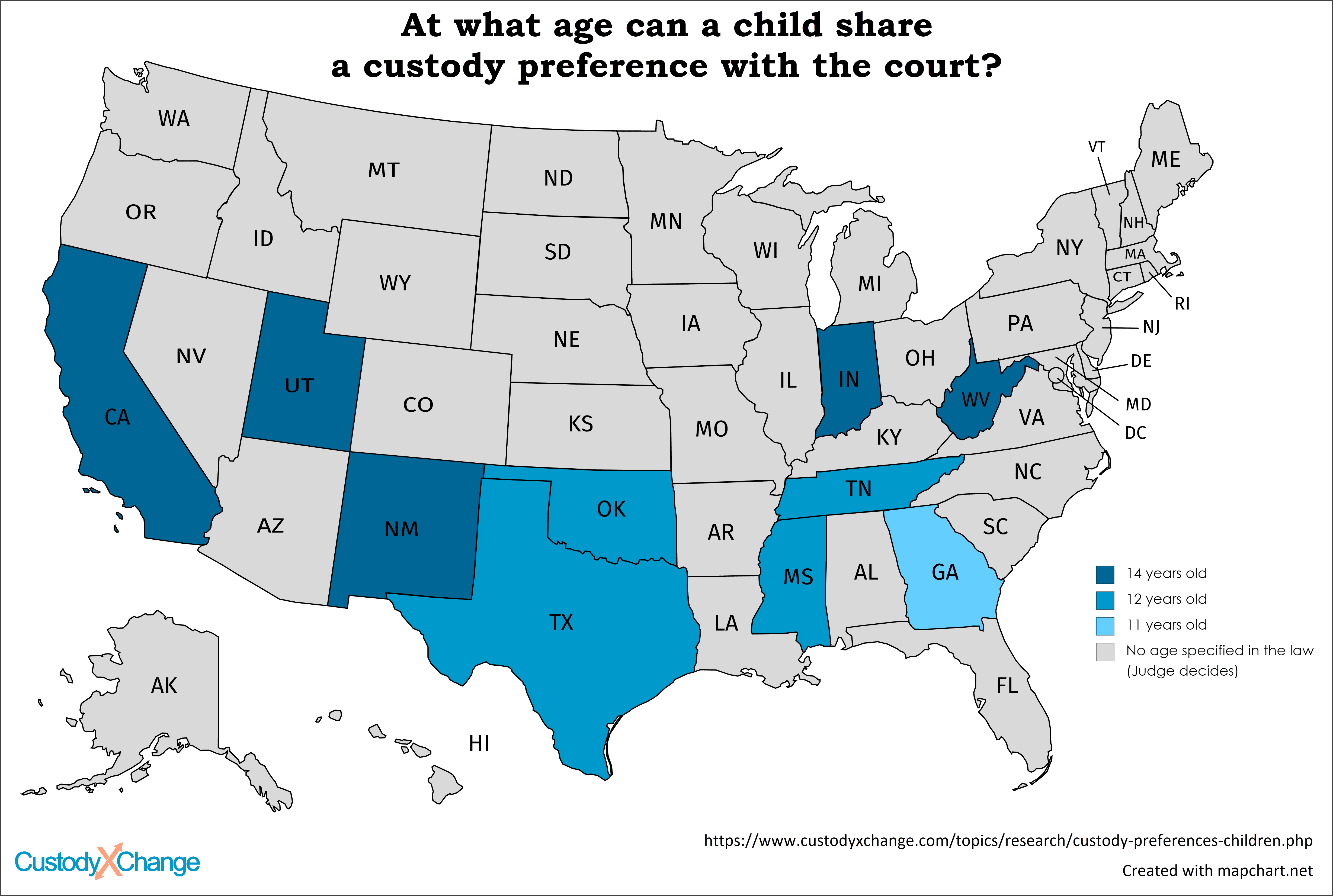what is the age in new york state when a child can choose which parent to live with
1 in 4 states don't require judge to consider kid's custody preference
November 17, 2020 — Many separating parents mistakenly call up their child tin choose whom to alive with.
In reality, Georgia is the merely U.S. state that lets a kid choose who takes physical custody of them. Even so, the child must be fourteen or older, and their choice must exist canonical past a guess.
Xiii states don't take statutes requiring a judge to consider a child'southward preference when deciding custody. All other states (plus Washington, D.C.) practise; judges there must have the views of mature children into business relationship.

Download: PNG | JPG Apply image with attribution
These findings come from an analysis of electric current state statutes by Custody X Change, which offers parents a web app for managing custody via parenting plans, calendars, expense tracking and more than. (Scroll to end for total state-past-state data.)
"If you go to court over custody, you need to understand your country's approach to many topics, including a child'southward right to share their opinion," said Ben Coltrin, Custody Ten Change co-founder and president. "There'due south fence over what's more than important: letting a child have a say or shielding them from parental disputes. How your state and guess view the event will touch on your case."
"There's debate over what's more than important: letting a child take a say or shielding them from parental disputes."
-Ben Coltrin, Custody X Change president
It's important to note that well-nigh custody decisions are made by parents in settlement agreements; these parents can consider their child's opinion however they want. When parents can't reach agreement, and so a judge decides what custody organisation would serve the kid's best interests.
Once the court issues a custody order, the kid must comply. This means your son or girl cannot refuse to see a parent who has been awarded custody or visitation time.
How sometime must a child be to weigh in?
All states let judges to consider the preference of a kid in a custody case, as long as the child is sufficiently mature. And, every bit we saw in a higher place, a large portion of states require judges to take a mature kid's opinion into account.
And so when is a child mature? Virtually states don't prepare a specific historic period, instead letting judges decide case by example.
When statutes do cite an age, xiv is most mutual. Three states (California, New United mexican states and West Virginia) presume children fourteen and older are sufficiently mature, while two (Indiana and Utah) requite extra weight to the opinions of kids in this range.
Another four states (Mississippi, Oklahoma, Tennessee and Texas) assume children 12 and upwards are mature enough to course a preference worth examining.
Georgia law sets the youngest age. It says children 11 and up can share their thoughts with the court. (And, remember, Georgia kids at least fourteen years old tin can choose which parent to live with, although a judge tin can override the choice if necessary.)
All these states give judges leeway to hear from younger children who seem particularly mature.

Download: PNG | JPG Use epitome with attribution
Overall, the older a child is, the more than impact their wishes have on their custody instance.
If your child is at to the lowest degree 14, a judge in any state is probable to hear what they have to say. On the other mitt, a child in the single digits probably won't get to counterbalance in. Children between these two groups fall in a grey expanse, and whether they can provide input depends on their land, estimate and maturity level.

Nationwide, children xiv and in a higher place can unremarkably weigh in on custody rulings. Children nine and under usually can't. The rest fall in a gray expanse.
How a child'due south stance fits into the large picture
A judge never has to award custody co-ordinate to a child'south wishes. Other factors — such every bit each parent's criminal history and bond with the child — always come up into play.
In addition, a approximate tries to assess whether a kid's preference for one parent is due to persuasion or leniency by that parent, which would give the preference less validity from the courtroom's perspective.
For example, a 15-year-old may non go to live with her mom equally she wishes if show shows the female parent lets her drive without a license. In dissimilarity, a 12-twelvemonth-old with concrete reasons for preferring a suitable parent could take considerable influence on a judge's ruling.
How kids share their opinions
Children typically do not testify most their preferences in court because the experience tin can be emotional and frightening.
Instead, they usually share their thoughts in conversation with the judge, a custody evaluator or someone appointed by the courtroom to represent their interests (like a guardian advertising litem). In Georgia, a child who'due south at least 11 can turn in a written affidavit.
Interviews with the judge take identify in the guess'southward office and are thus known equally in-chambers or in-camera hearings. Generally, a courtroom reporter and the child's legal representative attend. Sometimes the parents' attorneys are also immune in but non the parents themselves.
Some judges ask the kid directly whom they'd similar to live with, while others only ask related questions like, "What do you practice for fun with your mom?" In certain states, both parents must consent earlier the child may speak with a estimate. Other factors that vary include whether parents can suggest questions for the interview and whether they can read the transcript.
State-by-land information
| State | Judge must consider a mature child's opinion? | Historic period guidelines in the law |
| Alabama | Aye | |
| Alaska | Yes | |
| Arizona | Aye | |
| Arkansas | No | |
| California | Yes | A child xiv or older gets to address the court, unless the court determines it's not in the child's best interest. A kid nether 14 likewise gets to address the court if it's in their all-time interest. |
| Colorado | Aye | |
| Connecticut | No | |
| Delaware | Yeah | |
| Florida | No | |
| Georgia | Yes | A child 14 or older has the right to select which parent they live with, unless a guess finds the selected parent does not serve the child's best interests. The gauge considers the desires of a kid at least 11 only not yet 14. |
| Hawaii | Yes | |
| Idaho | No | |
| Illinois | Yes | |
| Indiana | Yes | The courtroom considers the wishes of the child, with more consideration given if the child is at least 14. |
| Iowa | Yep | |
| Kansas | Yes | |
| Kentucky | Yes | |
| Louisiana | Yes | |
| Maine | Yes | |
| Maryland | Yes | |
| Massachusetts | Yes | |
| Michigan | Yes | |
| Minnesota | Yep | |
| Mississippi | Yes | If the court considers both parents fit to have custody, the chancellor (judge) may consider the preference of a child 12 or older. |
| Missouri | Yes | |
| Montana | No | |
| Nebraska | Yep | |
| Nevada | Yes | |
| New Hampshire | No | |
| New Jersey | Yes | |
| New Mexico | Yep | If the child is 14 or older, the court considers their desires. If the child is under fourteen, the court decides custody per the child's best interests, considering factors similar the kid's wishes. |
| New York | No | |
| North Carolina | No | |
| North Dakota | Yes | |
| Ohio | No | |
| Oklahoma | Yes | The child gets to express a preference if the courtroom finds this is in the child's all-time involvement. The court considers the preference if the child is old enough to class an intelligent opinion. There's a presumption a child 12 or above is former enough. |
| Oregon | Yes | |
| Pennsylvania | Yes | |
| Rhode Island | Yeah | |
| Southward Carolina | Yes | |
| Due south Dakota | No | |
| Tennessee | Yes | The court considers the reasonable preference of a child 12 or older. The court may hear the preference of a younger kid. An older child'southward preference is normally given greater weight. |
| Texas | Aye | A child 12 or older gets to speak with the court in individual. A child under 12 may get to. |
| Utah | No | The court may consider the wishes of the child, considering the child'southward maturity. The desires of a child xiv or older get added weight. |
| Vermont | No | |
| Virginia | Yes | |
| Washington | Yes | |
| Washington, D.C. | Yep | |
| Due west Virginia | Yes | The court accommodates the preferences of a child 14 or older, if it'due south in the child's best interests. It also accommodates the preferences of a younger child mature enough to express an opinion, equally long as this is in the child's best interests. |
| Wisconsin | Yeah | |
| Wyoming | No |
Source: https://www.custodyxchange.com/topics/research/custody-preferences-children.php
0 Response to "what is the age in new york state when a child can choose which parent to live with"
Postar um comentário